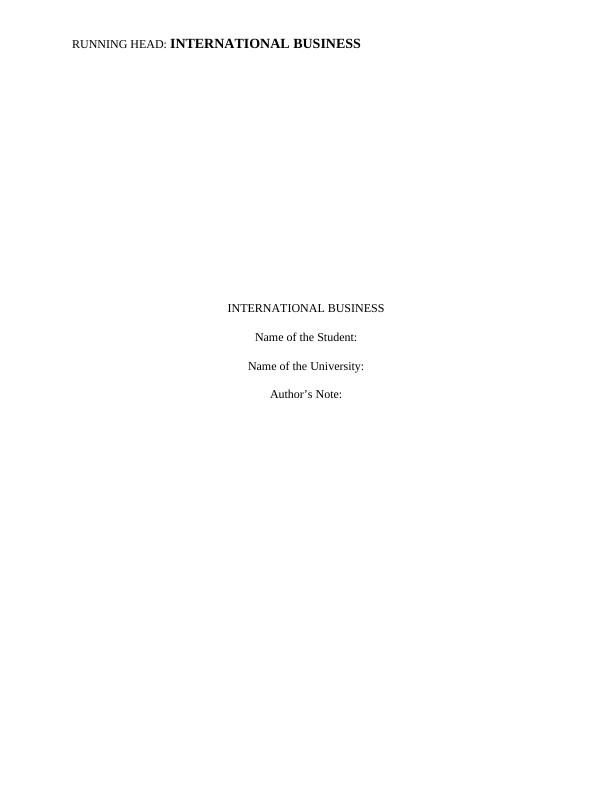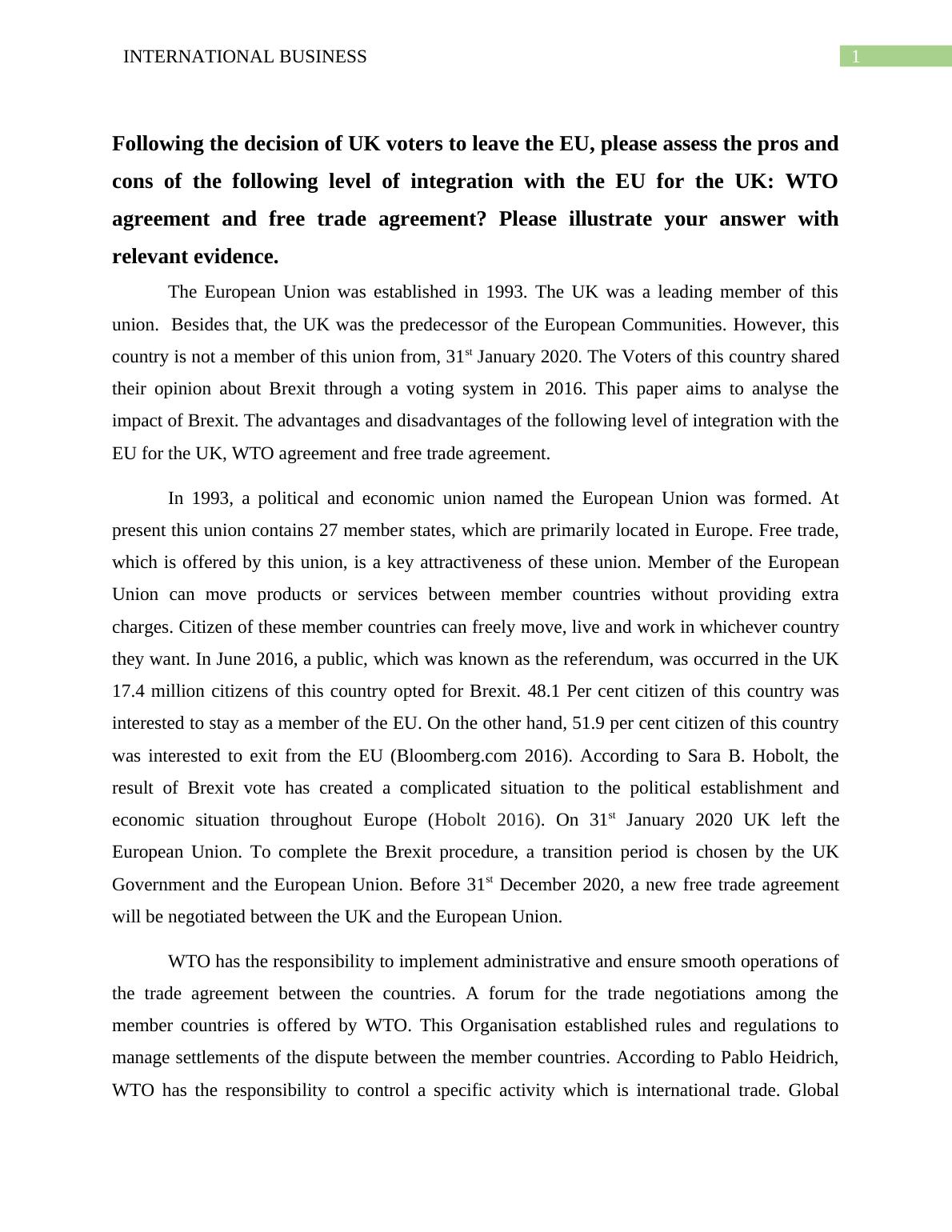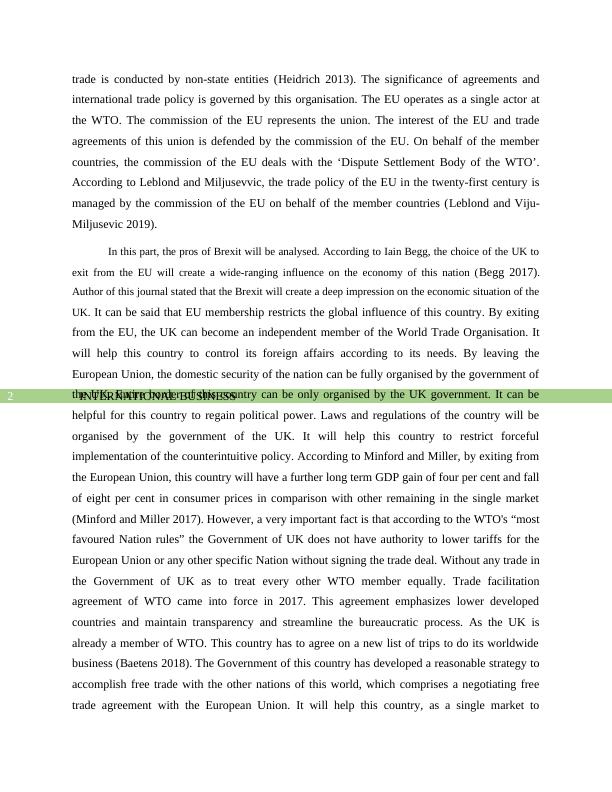The UK leaving the EU: WTO agreement or free trade agreement?
Added on 2022-10-19
8 Pages2759 Words100 Views
RUNNING HEAD: INTERNATIONAL BUSINESS
INTERNATIONAL BUSINESS
Name of the Student:
Name of the University:
Author’s Note:
INTERNATIONAL BUSINESS
Name of the Student:
Name of the University:
Author’s Note:

INTERNATIONAL BUSINESS1
Following the decision of UK voters to leave the EU, please assess the pros and
cons of the following level of integration with the EU for the UK: WTO
agreement and free trade agreement? Please illustrate your answer with
relevant evidence.
The European Union was established in 1993. The UK was a leading member of this
union. Besides that, the UK was the predecessor of the European Communities. However, this
country is not a member of this union from, 31st January 2020. The Voters of this country shared
their opinion about Brexit through a voting system in 2016. This paper aims to analyse the
impact of Brexit. The advantages and disadvantages of the following level of integration with the
EU for the UK, WTO agreement and free trade agreement.
In 1993, a political and economic union named the European Union was formed. At
present this union contains 27 member states, which are primarily located in Europe. Free trade,
which is offered by this union, is a key attractiveness of these union. Member of the European
Union can move products or services between member countries without providing extra
charges. Citizen of these member countries can freely move, live and work in whichever country
they want. In June 2016, a public, which was known as the referendum, was occurred in the UK
17.4 million citizens of this country opted for Brexit. 48.1 Per cent citizen of this country was
interested to stay as a member of the EU. On the other hand, 51.9 per cent citizen of this country
was interested to exit from the EU (Bloomberg.com 2016). According to Sara B. Hobolt, the
result of Brexit vote has created a complicated situation to the political establishment and
economic situation throughout Europe (Hobolt 2016). On 31st January 2020 UK left the
European Union. To complete the Brexit procedure, a transition period is chosen by the UK
Government and the European Union. Before 31st December 2020, a new free trade agreement
will be negotiated between the UK and the European Union.
WTO has the responsibility to implement administrative and ensure smooth operations of
the trade agreement between the countries. A forum for the trade negotiations among the
member countries is offered by WTO. This Organisation established rules and regulations to
manage settlements of the dispute between the member countries. According to Pablo Heidrich,
WTO has the responsibility to control a specific activity which is international trade. Global
Following the decision of UK voters to leave the EU, please assess the pros and
cons of the following level of integration with the EU for the UK: WTO
agreement and free trade agreement? Please illustrate your answer with
relevant evidence.
The European Union was established in 1993. The UK was a leading member of this
union. Besides that, the UK was the predecessor of the European Communities. However, this
country is not a member of this union from, 31st January 2020. The Voters of this country shared
their opinion about Brexit through a voting system in 2016. This paper aims to analyse the
impact of Brexit. The advantages and disadvantages of the following level of integration with the
EU for the UK, WTO agreement and free trade agreement.
In 1993, a political and economic union named the European Union was formed. At
present this union contains 27 member states, which are primarily located in Europe. Free trade,
which is offered by this union, is a key attractiveness of these union. Member of the European
Union can move products or services between member countries without providing extra
charges. Citizen of these member countries can freely move, live and work in whichever country
they want. In June 2016, a public, which was known as the referendum, was occurred in the UK
17.4 million citizens of this country opted for Brexit. 48.1 Per cent citizen of this country was
interested to stay as a member of the EU. On the other hand, 51.9 per cent citizen of this country
was interested to exit from the EU (Bloomberg.com 2016). According to Sara B. Hobolt, the
result of Brexit vote has created a complicated situation to the political establishment and
economic situation throughout Europe (Hobolt 2016). On 31st January 2020 UK left the
European Union. To complete the Brexit procedure, a transition period is chosen by the UK
Government and the European Union. Before 31st December 2020, a new free trade agreement
will be negotiated between the UK and the European Union.
WTO has the responsibility to implement administrative and ensure smooth operations of
the trade agreement between the countries. A forum for the trade negotiations among the
member countries is offered by WTO. This Organisation established rules and regulations to
manage settlements of the dispute between the member countries. According to Pablo Heidrich,
WTO has the responsibility to control a specific activity which is international trade. Global

INTERNATIONAL BUSINESS2
trade is conducted by non-state entities (Heidrich 2013). The significance of agreements and
international trade policy is governed by this organisation. The EU operates as a single actor at
the WTO. The commission of the EU represents the union. The interest of the EU and trade
agreements of this union is defended by the commission of the EU. On behalf of the member
countries, the commission of the EU deals with the ‘Dispute Settlement Body of the WTO’.
According to Leblond and Miljusevvic, the trade policy of the EU in the twenty-first century is
managed by the commission of the EU on behalf of the member countries (Leblond and Viju-
Miljusevic 2019).
In this part, the pros of Brexit will be analysed. According to Iain Begg, the choice of the UK to
exit from the EU will create a wide-ranging influence on the economy of this nation (Begg 2017).
Author of this journal stated that the Brexit will create a deep impression on the economic situation of the
UK. It can be said that EU membership restricts the global influence of this country. By exiting
from the EU, the UK can become an independent member of the World Trade Organisation. It
will help this country to control its foreign affairs according to its needs. By leaving the
European Union, the domestic security of the nation can be fully organised by the government of
the UK. Entire border of this country can be only organised by the UK government. It can be
helpful for this country to regain political power. Laws and regulations of the country will be
organised by the government of the UK. It will help this country to restrict forceful
implementation of the counterintuitive policy. According to Minford and Miller, by exiting from
the European Union, this country will have a further long term GDP gain of four per cent and fall
of eight per cent in consumer prices in comparison with other remaining in the single market
(Minford and Miller 2017). However, a very important fact is that according to the WTO's “most
favoured Nation rules” the Government of UK does not have authority to lower tariffs for the
European Union or any other specific Nation without signing the trade deal. Without any trade in
the Government of UK as to treat every other WTO member equally. Trade facilitation
agreement of WTO came into force in 2017. This agreement emphasizes lower developed
countries and maintain transparency and streamline the bureaucratic process. As the UK is
already a member of WTO. This country has to agree on a new list of trips to do its worldwide
business (Baetens 2018). The Government of this country has developed a reasonable strategy to
accomplish free trade with the other nations of this world, which comprises a negotiating free
trade agreement with the European Union. It will help this country, as a single market to
trade is conducted by non-state entities (Heidrich 2013). The significance of agreements and
international trade policy is governed by this organisation. The EU operates as a single actor at
the WTO. The commission of the EU represents the union. The interest of the EU and trade
agreements of this union is defended by the commission of the EU. On behalf of the member
countries, the commission of the EU deals with the ‘Dispute Settlement Body of the WTO’.
According to Leblond and Miljusevvic, the trade policy of the EU in the twenty-first century is
managed by the commission of the EU on behalf of the member countries (Leblond and Viju-
Miljusevic 2019).
In this part, the pros of Brexit will be analysed. According to Iain Begg, the choice of the UK to
exit from the EU will create a wide-ranging influence on the economy of this nation (Begg 2017).
Author of this journal stated that the Brexit will create a deep impression on the economic situation of the
UK. It can be said that EU membership restricts the global influence of this country. By exiting
from the EU, the UK can become an independent member of the World Trade Organisation. It
will help this country to control its foreign affairs according to its needs. By leaving the
European Union, the domestic security of the nation can be fully organised by the government of
the UK. Entire border of this country can be only organised by the UK government. It can be
helpful for this country to regain political power. Laws and regulations of the country will be
organised by the government of the UK. It will help this country to restrict forceful
implementation of the counterintuitive policy. According to Minford and Miller, by exiting from
the European Union, this country will have a further long term GDP gain of four per cent and fall
of eight per cent in consumer prices in comparison with other remaining in the single market
(Minford and Miller 2017). However, a very important fact is that according to the WTO's “most
favoured Nation rules” the Government of UK does not have authority to lower tariffs for the
European Union or any other specific Nation without signing the trade deal. Without any trade in
the Government of UK as to treat every other WTO member equally. Trade facilitation
agreement of WTO came into force in 2017. This agreement emphasizes lower developed
countries and maintain transparency and streamline the bureaucratic process. As the UK is
already a member of WTO. This country has to agree on a new list of trips to do its worldwide
business (Baetens 2018). The Government of this country has developed a reasonable strategy to
accomplish free trade with the other nations of this world, which comprises a negotiating free
trade agreement with the European Union. It will help this country, as a single market to

End of preview
Want to access all the pages? Upload your documents or become a member.
Related Documents
Significance of BREXIT for the British peoplelg...
|11
|3688
|295
EU Law - The implication of the Withdrawal Treatylg...
|10
|2776
|18
Significance of Brexit for British Peoplelg...
|13
|3680
|453
EU Law : Implication of the Withdrawal Treaty Over Brexitlg...
|9
|2230
|33
Impact of Brexit on Small Businesses in the UKlg...
|7
|1867
|458
Impact of Brexit on UK's ability to make its own laws and regulationslg...
|8
|1999
|134
